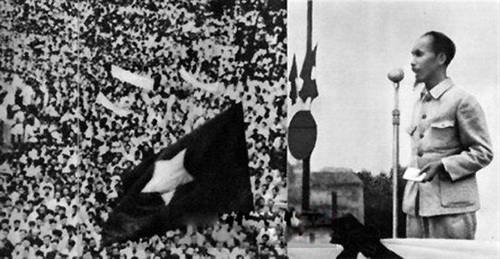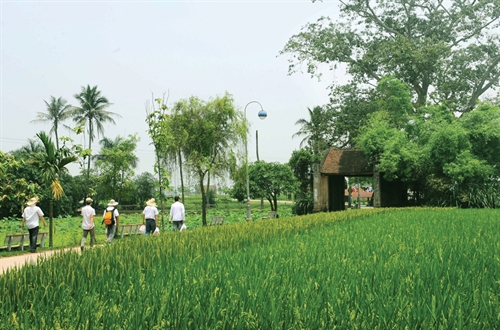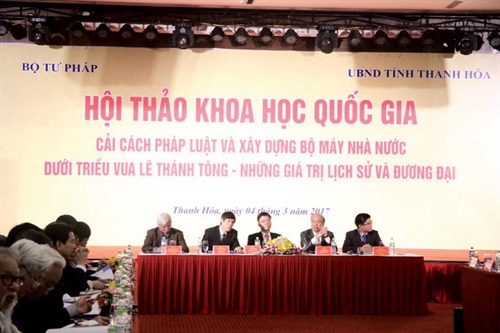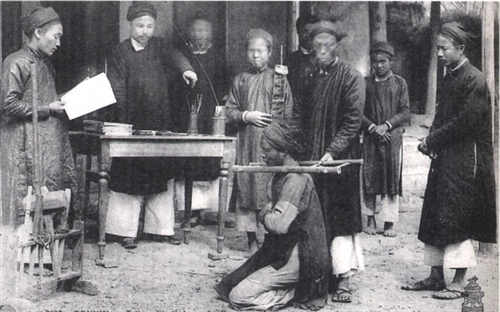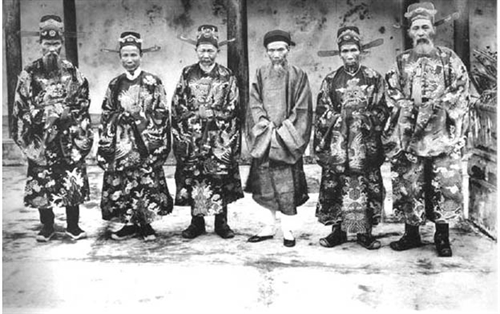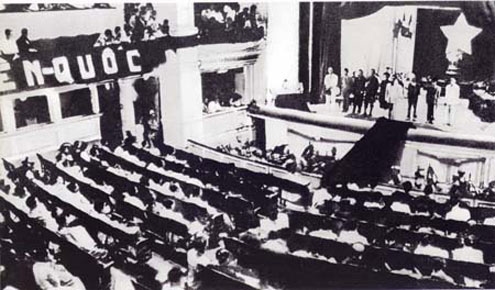Recently, the number of Vietnam’s reservations to treaties has risen together with the number of treaties to which Vietnam has acceded. This reality requires Vietnam’s legal system in general and law on treaties in particular be completed in the direction of protecting to the utmost Vietnam’s interests without violating the concluded treaties.
Nguyen Toan Thang, LL.D and Mac Thi Hoai Thuong, LL.M
Hanoi University of Law
Regulations on Vietnam’s reservations to treaties before the appearance of the 2005 Law on Treaties
The formulation and development of regulations on Vietnam’s reservations to treaties are associated to the formulation of Vietnamese legal documents regulating treaties, which can be summarized according to the following periods:
+ From 1945 to before the initiation of “doi moi” (renewal) policy in 1986
Immediately after the August 1945 Revolution was crowned with success, President Ho Chi Minh, on behalf of the Vietnamese State, signed two treaties, namely the March 6, 1946 Preliminary Convention and the September 14, 1946 Modus Vivendi.
By 1986, the number of treaties acceded by Vietnam was not many, largely bilateral treaties on assistance between Vietnam and a number of socialist countries. Vietnamese regulations on treaties during this period remained few, only provisions in the Constitution[1].
So, in this period, Vietnam did not have any regulation on reservations to treaties although it made a number of reservation declarations such as the declaration of reservations to Articles 10, 12 and 15 of the Geneva Convention on the treatment of prisoners of war, and of reservations to Articles 11 and 45 of the Geneva Convention on protection of civilians in wars.
+ From 1986 to before 1992
With the “doi moi” and open-door policy initiated by the Communist Party of Vietnam at its sixth National Congress in December 1986, the conclusion, accession to and implementation of treaties by Vietnam witnessed important steps forward.
On the basis of the 1980 Constitution and the Party’s renewal policy, on October 27, 1989, the State Council enacted the Ordinance on Conclusion and Implementation of Treaties (the 1989 Ordinance). On May 28, 1992, the Council of Ministers issued Decree 182/HDBT detailing the 1989 Ordinance. They were the first specialized legal instruments of Vietnam on the conclusion, accession to and implementation of treaties, thus laying the foundation for making reservations to treaties. Article 10 of the 1989 Ordinance said: “For multilateral treaties with provisions which need to be reserved, concerned bodies shall clearly state the requirements and contents of such reservation when submitting them for signing, ratification, approval or accession.” However, the 1989 Ordinance, which was made at the initial stage of national renewal when Vietnam’s external relations were not actually developed, just generally addressed the issue of reservation to treaties.
+ The period from 1992 to before the promulgation of the 2005 Law on Treaties
On April 15, 1992, the National Assembly passed the new Constitution (the 1992 Constitution) with provisions on the competence to conclude treaties of the President[2], the Government[3] and agencies involved in external activities. On the basis of the 1992 Constitution, the 1998 Ordinance on Conclusion and Implementation of Treaties and Decree 161/1999/ND-CP detailing a number of articles of the 1998 Ordinance were promulgated, inheriting the provisions of the 1989 Ordinance and Decree 182.
As compared to the 1989 Ordinance, the 1998 Ordinance made a step forward in providing reservations to treaties. It defined a reservation to a treaty as “the unilateral declaration issued by the Socialist Republic of Vietnam at the time of concluding, ratifying, approving or acceding to a multilateral treaty with a view to nullifying or changing the legal effect of one or a number of provisions of the treaty when it is applied to Vietnam.”[4]
The 1998 Ordinance initially dealt with basic matters of reservation.
Article 15 of the Ordinance prescribed the competence and time to make reservations as well as the form of reservation.
Bodies competent to make reservations were determined to be state bodies competent to decide on the conclusion, ratification or approval of or accession to treaties. The form of reservation must be clearly stated in the accession documents or reconfirmed in the ratification or approval documents. On the order and procedures, the bodies proposing the conclusion of treaties would determine the requirements and contents of reservation based on the comments of the Ministry of Foreign Affairs and related ministries, and submit them to the bodies competent to decide on the conclusion, ratification and approval of or accession to treaties.
The 1998 Ordinance also prescribed the competence, contents, order and procedures for withdrawal of reservations to treaties. Regarding competence, the state bodies which decided on the conclusion, ratification or approval of or accession to treaties, were competent to withdraw reservations. The Ministry of Foreign Affairs would carry out diplomatic procedures for reservation withdrawal and notify concerned bodies of the effect of such reservation withdrawal. The reservation withdrawal requests must be made in writing and specify such contents as legal grounds and requirement of the reservation withdrawal, specific contents of the reservations to be withdrawn and opinions of the Ministry of Foreign Affairs, Ministry of Justice and concerned ministries and sectors[5].
So, the 1998 Ordinance not only prescribed the contents, time and form of reservation and reservation withdrawal, but also supplemented provisions on the competence of bodies proposing reservations and bodies carrying out external procedures for reservations. However, it did not mention the acceptance of and protest against reservations of foreign contracting parties. Besides, it only required the recording of reservation contents in accession documents or their reconfirmation in ratification or approval documents. Therefore, the reservations made by Vietnam at the time of signing a treaty may become effective immediately after the signing without going through the ratification or approval procedures.
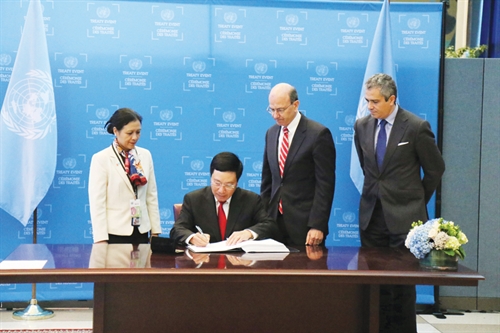 |
| Deputy PM and Foreign Minister Pham Binh Minh signs on behalf of the President the Treaty on the Prohibition of Nuclear Weapons on September 22 in New York__Photo: Huu Hoang/VNA |
Reservations to treaties under the 2005 Law on Treaties
In 2001, Vietnam acceded to the 1969 Vienna Convention on the Law of Treaties, which posed the requirement of incorporation of the Convention’s provisions in national laws. Besides, the practical implementation of the 1998 Ordinance revealed some inadequacies of the Ordinance. Therefore, on June 14, 2005, the 11th National Assembly passed the Law on Conclusion, Accession to and Implementation of Treaties (the 2005 Law), which contained many new provisions compared to the Ordinance.
The first important change was the definition of treaty. Under the 1998 Ordinance, Vietnam could conclude treaties in the name of the State, Government, Supreme People’s Court, Supreme People’s Procuracy, a ministry, ministerial-level agency or government-attached agency[6]. Whereas, according to the 2005 Law, the treaties which Vietnam conclude or accede to are only those concluded in the name of the State or Government, not treaties concluded in the name of Supreme People’s Court, Supreme People’s Procuracy and the like[7]. This is the change in the types of documents to which provisions on Vietnam’s reservations to treaties can apply.
For reservations to multilateral treaties, the 2005 Law devoted entire Chapter IV with seven articles containing specific provisions, both new and taken over from the 1998 Ordinance.
First, the Law clearly defined that the bodies competent to decide on reservations to treaties were “state bodies competent to decide on conclusion or approval of or accession to multilateral treaties.”[8]
Second, the Law required that, in the reports to state bodies competent to decide on conclusion, ratification or approval of or accession to treaties, the proposing bodies must clearly state the proposal to make reservation, requirements, contents and time for reservation declaration[9].
Third, the Law added provisions on notification of reservations, under which the Ministry of Foreign Affairs must notify the multilateral treaty depositories of Vietnam’s reservations within 15 days after receiving the decisions of competent state bodies on the ratification or approval of or accession to the treaties with provisions to be reserved by Vietnam. The Ministry of Foreign Affairs must notify the concerned state bodies of the effective date of Vietnam’s declaration of reservations within 15 days after receiving the notifications of the multilateral-treaty depositories[10].
Fourth, the Law contained new provisions on acceptance of or protest against reservations of foreign contracting parties[11]. According to Article 56, the proposing bodies must clearly state the requirements and contents of accepting or protesting against reservations of foreign contracting parties, proposing the time to put forth the reservation acceptance or protest and legal consequences. The National Assembly would decide to accept or protest against foreign contracting parties’ reservations to multilateral treaties which it decided to ratify or accede to; the President would decide to accept or protest against foreign contracting parties’ reservations to multilateral treaties which he or she decided to conclude, ratify or accede to; and the Government would decide to accept or protest against foreign contracting parties’ reservations to multilateral treaties which it decided to conclude, approve or accede to. The reservation acceptance or protest must be made in writing[12]. The responsibility to notify the acceptance of or protest against foreign contracting parties’ reservations rested with the Ministry of Foreign Affairs[13].
Fifth, regarding the procedures for reservation withdrawal, instead of providing that the state bodies which decided on the conclusion, ratification or approval of or accession to treaties[14] would receive the proposals on reservation withdrawal, the 2005 Law designated the Government as the sole body to receive such proposals. These state bodies were required to report to the Government on the reservation withdrawal after obtaining written comments from the Ministry of Foreign Affairs, the Ministry of Justice and related agencies and organizations[15].
Sixth, the Law added provisions on withdrawal of reservation protests. The procedures for this withdrawal were similar to those applicable to the withdrawal of reservations[16].
All the above-mentioned revisions totally conform with the 1969 Vienna Convention on the Law of Treaties and protect Vietnam’s rights and interests when signing or acceding to multilateral treaties. The specific and complete provisions on reservation in the 2005 Law created a stable and favorable legal framework for Vietnam’s reservation activities in accordance with international law. However, such provisions still exposed some limitations.
First, besides the provisions on reservation in the 1969 Vienna Convention and national laws, there also exist unilateral declarations made at the time of conclusion, ratification or approval of or accession to multilateral treaties. In reality, a number of multilateral treaties have provisions clarifying the difference between reservations and declarations of member countries. In principle, such declarations do not affect the effect of treaties.
Second, under Articles 21 and 54 of the 2005 Law, before proposing reservations in their reports to the Government on conclusion, ratification or approval of or accession to multilateral treaties, state bodies must send draft reports to the Ministry of Justice (in the dossiers of request for verification) and gather comments of other concerned bodies. However, these provisions just dwell on the general order and procedures but not the responsibility of concerned bodies.
Reservations to treaties under the 2016 Law on Treaties
The emergence of the 2016 Law on Treaties (2016 Law) aims to institutionalize new provisions of the 2013 Constitution. The contents of provisions on reservations to treaties in the 2016 Law are simple and easy to understand and apply. Legal issues related to reservations to treaties are largely dealt with in Chapter III, from Article 47 to Article 51. These articles provide the competence for reservation; acceptance of or protest against reservations of foreign contracting parties; competence to decide on acceptance of or protest against reservations of foreign contracting parties; the order and procedures for accepting or protesting against reservations of foreign contracting parties; and withdrawal of reservations or withdrawal of reservation protests.
Basically, the 2016 Law makes minor changes in the contents related to reservations to treaties as compared to the 2005 Law, mainly rearranging the provisions on reservations to treaties.
Regarding external procedures for reservation, which are prescribed in different articles[17] in the 2005 Law, the 2016 Law prescribes them in only one article (Article 65). Under this Article, the Ministry of Foreign Affairs must notify Vietnam’s reservations to the multilateral treaty depository in the written notifications of the ratification, approval of or accession to treaties with provisions to be reserved by Vietnam. It must also notify the multilateral treaty depository of the acceptance of or protest against reservations of foreign contracting parties within 15 days after receiving the decisions of competent state bodies or forward such notifications together with documents on ratification, approval of or accession to treaties. The Foreign Minister is assigned to sign the external notifications on Vietnam’s reservations, acceptance of or protest against reservations of foreign contracting parties, or withdrawal of reservations or reservation protests, and send them to the treaty depository[18].
Regarding the competence to decide on withdrawal of reservations or withdrawal of reservation protests, instead of generally providing that “state bodies competent to decide on reservations or protest against reservations have competence to decide on withdrawal of those reservations or reservation protests,”[19] the 2016 Law specifies the competence, order, procedures for deciding to withdraw reservations or reservation protests, if such decision falls under the jurisdiction of the National Assembly, President or Government[20].
Article 15 of the 2016 Law prescribes the competence to decide on conclusion of treaties. Accordingly, the President will decide to conclude treaties in the name of the State; the Government will decide to conclude treaties in the name of the Government. A decision to conclude a treaty must be made in writing with the following contents:
“... Reservations, acceptance of or protest against reservations of foreign contracting parties, declaration with regard to the multilateral treaty...”. Referring to the provision of Article 47, it can be realized that the competence to decide on reservations at the time of concluding a treaty rests with the President or Government on a case-by-case basis.
So, the 2016 Law has seen substantive and comprehensive amendments concretizing the 2013 Constitution’s provisions on treaties and creating a strict and flexible legal framework for the conclusion and implementation of treaties in national interests. However, the 2016 Law would be better if it is supplemented with provisions on the responsibility of state bodies when they propose improper reservations or fail to propose reservations to articles which need reservations. Especially, the Law still fails to state whether the Ministry of Justice and Ministry of Foreign Affairs may propose reservations when they verify treaties. Vietnamese law on reservations to treaties also needs more specific and clearer provisions on time limits for completion of specific procedures and on tasks and responsibilities of concerned bodies.
In addition, there should be more specific and clearer provisions on the competence, procedures and requirements on reservations made by Vietnam at the time of signing a treaty. Provisions on the responsibility of concerned bodies, such as the Ministry of Justice and Ministry of Foreign Affairs, when they propose improper reservations or reservation protests, should also be added.
Besides, although the 2016 Law already distinguishes between declaration and reservation, it fails to define the term of declaration and designate bodies competent to make and withdraw declarations.-
